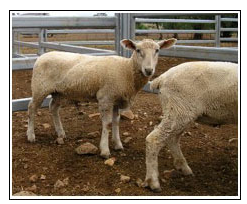Preventing waterbelly in feedlot lambs
PRODUCTION ADVICE - MARCH 2020 - ANIMAL HEALTH
By Mark Corrigan
District Veterinarian
P: 02 6051 2208 | M: 0428 256 431 | E: mark.corrigan@lls.nsw.gov.au
With the increased numbers of wether lambs being fed in opportunistic feedlots, producers should be on the lookout for urolithiasis, more commonly known as waterbelly.
Waterbelly is caused by stones forming in the bladder. If the stones are large enough, they can cause partial or complete blockage of the urethra, making the animal unable to urinate. Initial signs include reluctance to move and straining to pass urine. While stone formation can occur in male and female animals the urethra is very long and narrow in males, particularly wethers, making them more likely to become blocked by stones. Eventually, the blocking of the urethra can cause the bladder to rupture or the urethra to perforate, causing leakage of urine within the abdomen and prepuce (foreskin). This is seen as a large swollen belly. Once the bladder ruptures, the animal will deteriorate and eventually die.
On post-mortem, the site of the obstruction is identified by discrete calculi (stones) in the urethra. If the urethra has been perforated, there will be leakage around the prepuce, and if the bladder has ruptured, the abdomen will be filled with urine.
There are multiple factors that contribute. These include:
- grain-based diet (inappropriate calcium/phosphorous ratio). Grain has high phosphorous compared with calcium; there needs to be more calcium than phosphorous
- hard water
- decreased water consumption.
To prevent water belly in your stock:
- ensure a calcium-to-phosphorus ratio of about 2:1.
- increase water intake by providing clean, good-quality water and good-quality roughage.
- Include limestone at 1.5 per cent of the diet in a feedlot. Alternatively, providing a loose lick of 50 per cent salt and 50 per cent lime ad-lib is an easy option. Salt not only acts as an attractant but can increase water consumption, helping to flush the bladder out.
If you suspect urolithiasis, contact your local district veterinarian on 1300 795 299, and they will be able to discuss treatment further with you.